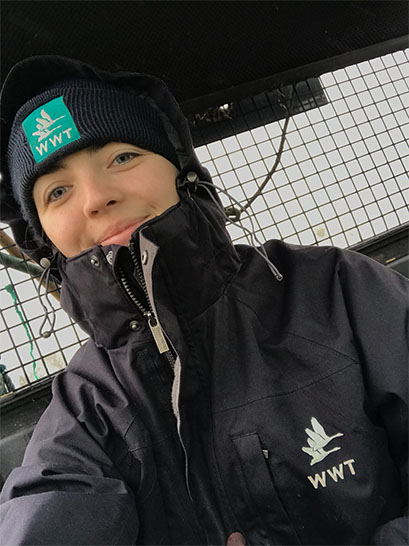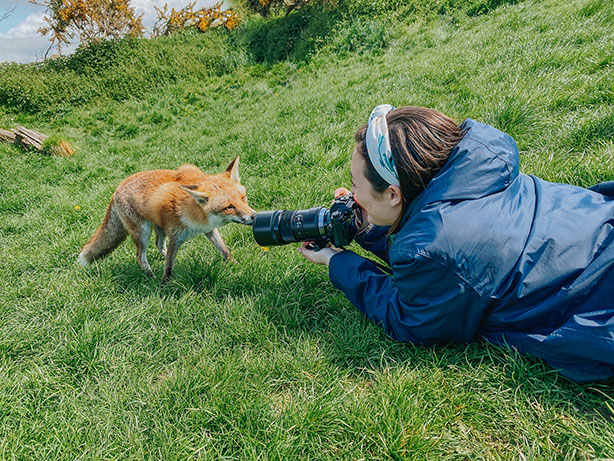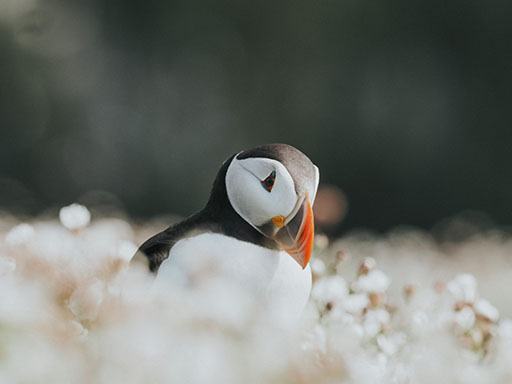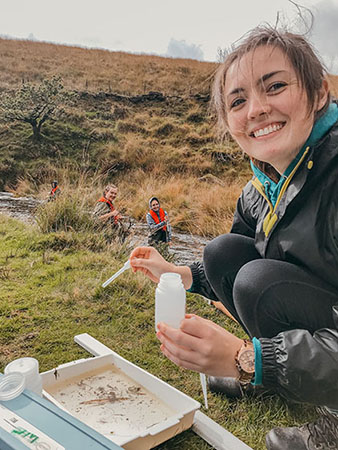Breaking Into the Wildlife Filmmaking Industry
This post is greater than 6 months old - links may be broken or out of date. Proceed with caution!

By Lily Harper, Natural History Researcher
The filmmaking industry is perhaps not the first you think of in terms of working with wildlife, but it does a lot for conservation and positive environmental behaviour change. In Bristol, where I live and work, it’s not an easy industry to break into, and getting your foot in the door can take a while. But the beauty of it is that pretty much everybody enters it through their own unique route, and there are no rules or specific qualifications you need to get started.
If you want to work in Natural History television, it is certainly beneficial to have some kind of degree, whether it’s Zoology, Biology, or Wildlife Conservation, which is what I did. Any of these degrees will give you great field experience studying things like animal behaviour and ecology that will help a lot when applying for science-based television roles. Of course, any kind of film degree would also be hugely helpful. Having a degree is by no means compulsory, though. The other common route into the industry is to start off as a Runner for a production company and work your way up to a Researcher role that way.

Throughout my degree, I was focused on volunteering (a LOT of it!) for organisations that I knew would further my career in Wildlife Filmmaking. I did a mixture of working for hands-on ecological organisations such as Action for the River Kennet, the Wildfowl and Wetlands Trust (where I completed a long-term work placement), and Somerset Wildlife Trust, carrying out practical conservation work, species surveys and monitoring, and identification work, as well as a range of research and media volunteering for companies like Silverback Films. Volunteering as much as you can not only adds a lot of relevant experience to your CV, but also allows you to network and get your name into the right circles. One of my favourite volunteering experiences was for the Bristol Festival of Nature this year, as I tailored my sessions across the festival week so that they were all directly related to nature and science media production.
I gained valuable experience (and friends for life) working for Oak Island Films; my first ‘proper’ position in wildlife filmmaking. I learnt so much in the space of a few months here, and built my confidence in an industry that can be daunting when you first come into it. They offer a training programme, so definitely take a look at that if you are just starting out in your career. During my time at Oak Island I managed to get a broadcaster credit on an upcoming mini-landmark natural history series, which is one of the first things to try to achieve when you’re starting out; once you have that first credit, everyone takes you a little more seriously.

I am now working for Plimsoll Productions: the largest indie production company in Bristol, who have produced some incredible natural history shows such as Hostile Planet with Bear Grylls, Tiny World with Paul Rudd, and Super/Natural with Benedict Cumberbatch. I am currently in the process of earning my second broadcaster researcher credit, which is really exciting.

Something that I have found to be really helpful when trying to get a job in this industry is that I have a genuine passion for film and photography; it’s shocking how many people making wildlife focused television don’t actually watch any of it themselves! So, you can set yourself apart from other job applicants by being up-to-speed on everything that’s recently come out, especially from the production house you’re interviewing at. Similarly, many Researchers in the industry are brilliant writers and communicators but can’t shoot or edit, so if you go out and shoot your own wildlife photography, there’s your USP. If you want to check mine out, my website is www.lilyharper.co.uk.
If I could give one piece of parting advice for getting into the industry, it would be to network like your life depends on it. If you are applying for a job that has already been advertised, you’re up against 20-30 people, easily. If, however, you make connections by adding people on LinkedIn and asking them to go for a coffee, hopefully (if you make a good impression!) they’ll get you the inside scoop on upcoming roles before they hit the job ad websites. That isn’t to say you should hound people to give you a job - just make friends and go to every networking event you can, as well as events like Wildscreen in Bristol, a week-long celebration of wildlife filmmakers including screenings, mixers, and workshops.
The most important thing is not to give up. If you have your heart set on being a wildlife filmmaker, you can be - from whatever your background is and however many qualifications you have. Just try to tailor your studies, volunteering, and work experience to either film or nature and you’ll be on the right track.
First published in CJS Focus on Working with Wildlife in association with The Wildlife Trusts on 17 October 2022. Read the full issue here
More from Lily Harper